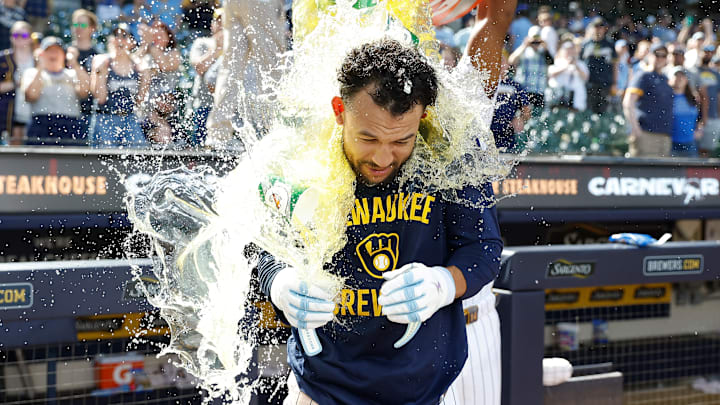As the MLB trade deadline approaches, teams across the league are scrambling to upgrade their rosters for the stretch run. But for the Milwaukee Brewers, the best move might be standing pat after their minor trade for Danny Jansen on Monday evening.
The Crew is once again in contention for another bite at the apple, due in part to their year-in-and-year-out deadline strategy of not overpaying for short-term upgrades. It has resulted in a deep MLB roster, a strong farm system, and a clubhouse built on chemistry and cohesion. Rather than risking that stability for a short-term splash, there’s a case to be made that remaining quiet for the rest of the trade deadline could be the smartest strategy of all.
Reasons the Milwaukee Brewers should stand pat at the deadline
1) Maintaining depth can pay dividends this year and in the future
The adage "deal from a position of strength" is often tossed around at trade deadline time. In the Brewers’ case this year, they have a surplus of starting pitchers on the 40-man roster, numerous elite shortstop prospects, and after the 2025 MLB draft, they now have more than a few attractive power-hitting corner infield talents.
The Brewers might be tempted to leverage their organizational depth by trading a veteran arm like José Quintana or Nestor Cortes, players with big-league success such as Tobias Myers or Logan Henderson, or prospects such as Cooper Pratt, Luis Peña, Blake Burke, or Brock Wilken, just to name a few.
However, Milwaukee is no stranger to how quickly pitching depth can be tested. In recent postseasons, they’ve had to compete without Devin Williams and Brandon Woodruff. This season, with Jacob Misiorowski and Woodruff on pitch counts and Cortes returning from a second elbow injury in 12 months, the importance of a deep, healthy rotation is clearer than ever, especially after early-season injuries exposed just how thin things can get.
Looking beyond this season, the Brewers will want to preserve as much infield depth as possible within the organization. Brice Turang appears to be a long-term fixture, but Rhys Hoskins is likely to depart this winter. While Joey Ortiz provides elite defense, in the future, the team may look internally to add competition to spark more offensive production. As for Caleb Durbin, there’s no guarantee he’s the third baseman of the future, and given the profile of infield prospects currently in the system, that seems increasingly unlikely.
2) Making a move, just to make a move, is not worth it
Standing pat, or making another low-profile trade like the Jansen deal, might not generate excitement in the moment, but it can often be the smartest approach. In past years, Milwaukee has made a few moves simply for the sake of action, and those decisions have backfired.
Take 2018, for example. The Brewers made an ill-fitting trade for Jonathan Schoop, sending Jonathan Villar and two prospects to the Baltimore Orioles in return. Schoop never found a clear role on the roster, hit just over .200 during his brief stint, and made only one start during Milwaukee’s deep postseason run, finishing with just eight total at-bats in the 2018 playoffs.
Three years later, Milwaukee knowingly traded for an injured Trevor Rosenthal because acquiring bullpen arms is what teams do at the deadline. However, they gave up a solid prospect in Tristan Peters, and after a new injury, Rosenthal never pitched for the Brewers.
This year, there’s a clear argument for adding help at shortstop and third base, two positions where Milwaukee could use a boost. However, if the Brewers stick to the strategy of acquiring only rental players or marginal upgrades, it might provide some depth but also carries the risk of backfiring without delivering meaningful impact.
In a season where the under-the-radar Brewers are once again firmly in contention to take another bite at the apple, remaining quiet at this year’s trade deadline could be a wise decision. Protecting the team’s pitching depth and promising prospect talent, areas where they’ve recently struck gold, serves not only their immediate playoff hopes but also the franchise’s long-term success.
